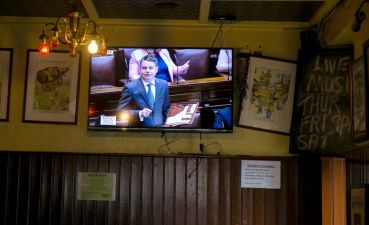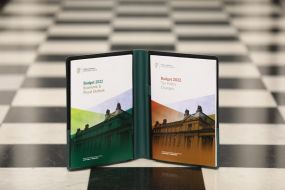Welfare increases in Budget 2022 are insufficient to keep people afloat in a sea of rising living costs, according to groups working with those experiencing poverty in Ireland.
The Society of St Vincent de Paul (SVP) said budgetary measures announced on Tuesday, such as a €5 increase in core social welfare payments, mean not enough will change for those living below the poverty line.
The new Budget was “an opportunity missed to commit to benchmarking social welfare rates to an adequate level over time,” SVP added, in a response echoed by the European Anti-Poverty Network Ireland.
Meanwhile, Ireland’s national organisation for one-parent families described the Budget as “piecemeal” and said it failed to deliver for the State’s poorest families, while the Children’s Rights Alliance said older children living in poverty had been overlooked.
SVP’s head of social justice, Dr Tricia Keilthy, welcomed the Budget's increase in social welfare payments but said these “just about cover the increase in the cost of living after two years when the rate didn’t rise.”
“They are still at a level that is below the poverty line and well below the cost of a minimum standard of living. The increase in the payment for older children falls short of the support that families need,” she added.
Inequality
SVP also welcomed increased investment in both childcare and the hot school meals programme, as well as extra supports for DEIS schools. However, it said that from its members’ experience, many children experiencing disadvantage do not attend a DEIS school.
The European Anti-Poverty Network Ireland also called on the Government on Tuesday to commit to benchmarking social welfare rates against the cost of living, as represented by the Minimum Essential Standard of living (MESL).
Director of EAPN Ireland, Paul Ginnell, said the Covid-19 pandemic had “highlighted and perpetrated inequality across Ireland” and said more must be done to ensure the State meets its anti-poverty commitments to reduce consistent poverty to two per cent or less by 2025.
“Community and voluntary sector organisations have found themselves providing an emergency response to households who are struggling to afford basics such as food and heating due to income inadequacy and rising living costs,” he said.
“This situation already existed before Covid-19. The annual budgetary process has a significant role to play in addressing poverty in Ireland both in ensuring everyone can access an adequate income, and providing the necessary investment in our public services.”
Lone parents
One Family, Ireland’s national organisation for one-parent families, described the Budget as “piecemeal” and said it failed to deliver for the State’s poorest families.
Chief executive of One Family, Karen Kiernan, said: “We welcome the measures such as the €10 increase in the Back to School Clothing and Footwear Allowance (BSCFA) for each qualifying child and we especially welcome that the income threshold for single parent households is now the same as that of two parent households; this is something we have campaigned for.
“While on the Carer's Allowance, the income disregard increases for single carers and lone parents is to be welcomed too.
“We have huge concerns though, about the lack of supports for one-parent families in the rental sector while private landlords are supported, we see no help for these families.
“The investment in childcare is a welcome step on the road to a fully publicly funded system, but it’s imperative the additional funding makes access easier for low-income families.”
Child poverty
The Children’s Rights Alliance meanwhile said new measures “to help families to keep their heads above water are welcome but a more joined-up approach is needed to make inroads in tackling child poverty.”
The alliance welcomed the Budget’s €4 million allocation to the hot school meals programme, the €10 increase in the BSCFA, and a record €716 million investment in childcare along with proposed changes to the National Childcare Scheme which “will unlock access to childcare for up to five thousand of our most disadvantaged children and young people.”
However, chief executive of the alliance Tanya Ward said older children living in poverty had been overlooked.
“An extra €3 a week won’t even cover their lunch for a day, especially with the cost of living on the rise,” she said.
“Budget 2022 contains clear measures that will address child poverty particularly when it comes to education, health and nutrition. Child poverty is on the rise in Ireland, and it has no doubt been negatively impacted by the Covid-19 pandemic.
“We need the Government to take a step back and look at the bigger picture and ensure there is a joined-up approach to tackling child poverty. We need a driver within Government to deliver an ambitious national child poverty action plan. We called on the Government to invest €3.5 million in an interdepartmental unit to do this.”
Childcare providers
Early Childhood Ireland, which supports 3,900 childcare members nationwide, also welcomed the Budget “as a step in the right direction with major reform now made possible.”
The group's director of policy, Frances Byrne, said the Budget measures represent long-overdue progress towards increasing Ireland’s investment in childcare to at least one per cent of GDP.

“There is still much work to be done to bring Ireland’s childcare system in line with other EU member states. However, this increased funding will move us in the right direction. It will enable childcare providers to plan for the long term; staff to enjoy greater job security; and offer parents some reassurance about accessing places for their young children,” she said.
Childhood Services Ireland, the Ibec trade association for childcare providers, however said that the Budget does not address affordability for parents or help future sustainability for childcare providers.
Director Darragh Whelan said: ‘’Extending the amount of subsidised childcare hours does nothing for parents who can’t afford childcare in the first place. What the parent needs is increased universal subsidies, as we called for in our pre-Budget submission.
“Waiting lists are already far too long and there simply aren’t enough childcare places to meet demand. The proposed funding for staff wages is welcome but the investment will have to be significant to reduce parental fees and ensure providers can afford to keep their doors open and the lights on.’’







